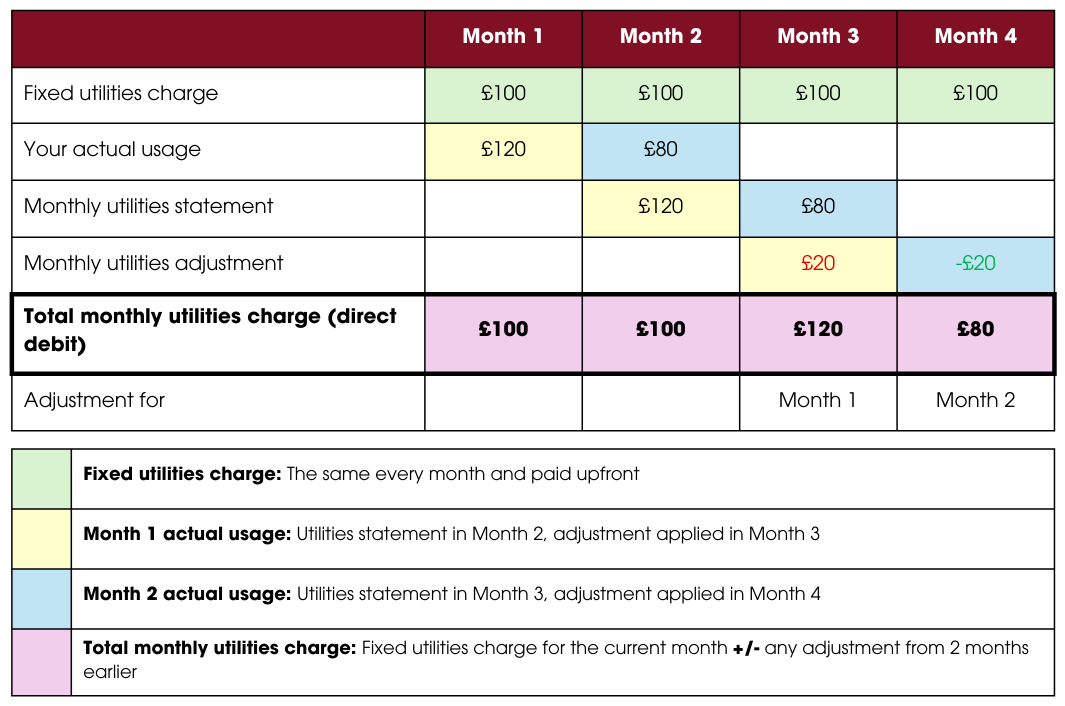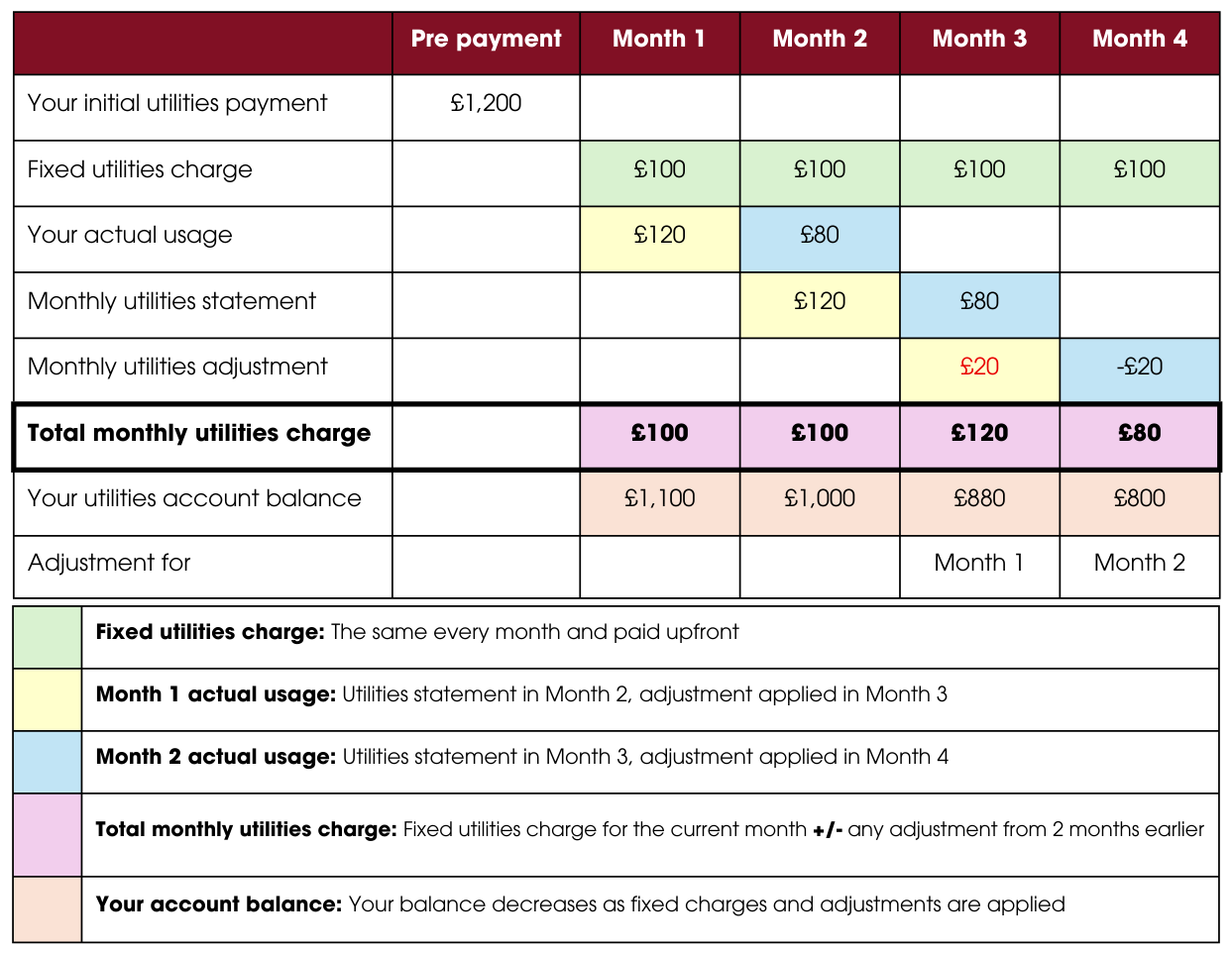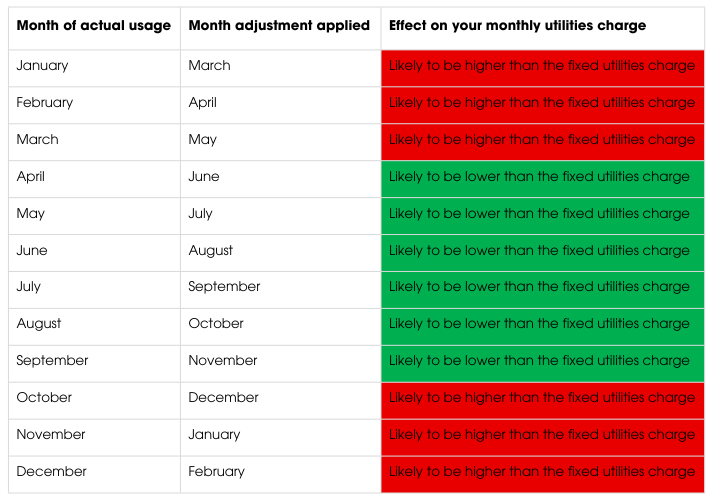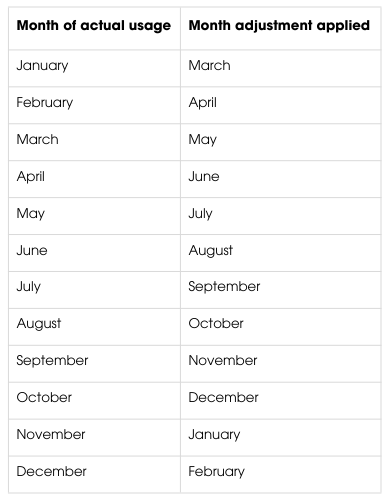EVERYTHING YOU NEED TO KNOW ABOUT YOUR UTILITIES
Here are some common questions and answers about your utilities. Take a look and if you have any questions, you can find contact details at the bottom of the page.
Our utilities are managed by Community Utilities, a utilities billing agent, operating on behalf of residential buildings like ours across the UK. They manage the day-to-day aspects of your utilities, including queries related to your consumption, statements, meter readings and the utilities portal. They’ll tell us what to charge you, and we will pass this payment on to you as part of your monthly or upfront rent payments if you decide to pay upfront.
Your utility charges include electricity, heat, and water, including the costs of cold water, hot water, heat, and wastewater. You’ll be charged in pence per unit (kWh) of fuel for electricity/heat, with a daily standing charge in pence per day. For water, you'll be charged in pounds per unit of water (m3) with a daily standing charge in pence per day.
On 1 April of every year, we secure a new 12-month fixed-term agreement. The annual rates (for unit and standing charges) are based on several factors, including the cost of energy purchased during the fixed period and these are agreed with our energy partner.
When you move in, your utilities are set up so you can use energy immediately. You pay a fixed utilities charge each month based on your apartment type via Direct Debit. After the month ends, your actual usage is measured, and a statement is issued within 10 days. Any difference between what you’ve paid and what you used is applied the following month and collected alongside that month’s fixed charge.
This means that your monthly utilities payment is made up of 2 parts:
• Fixed utilities charge based on your apartment type for the given month
• Plus, an adjustment (credit if you used less than the fixed charge, or a debit if you used more) from your most recent statement
For new residents, this means that during your first 2 months, you’ll only pay the fixed utilities charge, and adjustments for your actual usage are applied in subsequent months.
Example for a resident who has just moved in (first 4 months only)

In the example above, you pay the fixed utilities charge of £100 in Months 1 and 2 only. During Month 2, your utilities statement shows that you used £120 in Month 1 (we email this to you, or you can see it via the Utilities portal). In Month 3, you’ll pay your fixed utilities charge of £100 for that month, plus a £20 adjustment covering your unbilled usage from Month 1, making your total £120. In Month 2, you only use £80, so we deduct £20 from your Month 4 payment.
Your upfront utilities charge is calculated using a fixed charge based on the average utility usage for your apartment type. This payment is made in advance to cover the upfront period.
After the first month ends, your actual usage is measured, and you receive a statement within 10 days. Any difference between what you’ve paid and what you actually used is applied to your account as adjustment the following month.
This means that your monthly payment is made up of 2 parts:
• Fixed utilities charge based on your apartment type for the given month
• Plus, an adjustment (credit if you used less than the fixed charge, or a debit if you used more) from your most recent statement
For new residents, this means that during your first 2 months, you’ll only pay the fixed utilities charge, and adjustments for your actual usage are applied in subsequent months.
Because your utilities are paid upfront, each month’s total utilities charge gradually decreases your balance as the adjustments and fixed charges are applied. At the end of your tenancy, any remaining outstanding balance (credit or debit) will be settled with your final end-of-tenancy bill (see question - what happens when I move out).
Example for a resident who has paid upfront for 12 months (first 4 months only)

In the example above, you pay £1,200 upfront for your utilities, covering 12 months of fixed charges at £100 per month. Each month, £100 is deducted from your account balance for the fixed charge. During Month 2, your utilities statement shows that you used £120 in Month 1 (we email this to you, or you can see it via the Utilities portal). In Month 3, a £20 adjustment for your unbilled usage from Month 1 is applied alongside your fixed charge of £100, making your total £120. In Month 2, you only use £80, so we deduct £20 from your Month 4 payment. Your account balance gradually decreases as the fixed charges and adjustments are applied.
Yes. After the first 2 months of your tenancy (see question - why do I only pay a fixed utilities charge for the first 2 months), your monthly utilities charge is made up of 2 parts:
• Fixed utilities charge: based on your apartment type for the given month
• Adjustment: a credit or debit applied based on your usage from 2 months earlier
These adjustments can increase or decrease your monthly charge depending on your usage, which typically rises in winter and falls in summer.

A standing charge (or shown as a metering charge on your monthly statements) is a fixed daily amount every UK resident must pay for energy and water, no matter how much you use. Every apartment pays the charge, and it covers the costs our energy supplier takes on to get you your energy. Think of it like a line rental but for your energy rather than your phone.
At the start of your tenancy, you pay a fixed monthly utilities charge based on your apartment type, so you can use energy immediately.
Like most energy providers, you receive a utilities statement of use after the month has ended (within 10 days). Any adjustment (a credit if you used less than the fixed charge, or a debit if you used more) is collected with that month’s fixed charge via Direct Debit, typically on or before the 1st of the following month.
This means that in your first 2 months, you only pay the fixed utilities charge. * At the end of your tenancy, any remaining adjustments for the last months are applied to part of your final end-of-tenancy balance.
* If you lived with us before 1 April 2025, the same process applies, but your first 2 fixed utilities charges were in April and May 2025.
The lead resident (primary resident on the tenancy) will receive a utilities statement of usage within 10 days of the end of each month, via email and in the Utilities portal. Any adjustment for the difference between your fixed utilities charge and your actual usage is collected with that month’s utilities charge via Direct Debit, typically by the 1st of the following month.
If you’re a new resident, the lead resident will receive an email with a link to register for an account within 2 weeks of moving in. If you’re having trouble accessing your account or have not received a link to register, please get in touch with Community Utilities at [email protected].
Community Utilities only uses estimated readings when:
• There is an issue with your meter data at the beginning or end of the month
• You live at Landsby, where water readings are taken quarterly (see below)
Estimates are based on your previous average usage for your apartment type, and heat is never estimated. Below is an example of how you can tell from your statement if we have used estimated readings.

The goal is for your statement to reflect your actual usage. If estimates are used:
• We work with Community Utilities to resolve issues quickly
• Once actual readings are available, any difference will be rebilled to your account
• Your statement will be reissued as a Credit Memo in the Utilities Portal (see question - why does my resident app show a rebill)
Landsby only
Water meter readings are taken quarterly. During each quarter, charges are initially based on estimated usage. At the end of each quarter (March, June, September and December), Community Utilities will take your meter readings and if they have over or underestimated your usage, they will rebill your account to reflect your actual usage.
Head to 'My account' > 'Payment summary' to see your recent charges and payments.
Community Utilities manage your utilities statements and always aim to provide one using the energy you’ve used. Sometimes an estimated reading is used - for example:
• If there’s an issue with your meter or
• At Landsby, where water readings are estimated monthly and actual readings are taken quarterly (see question - why does my statement show estimated readings)
Resident app:
Any difference will appear as a rebill (credit or charge) in the ‘Payment Summary’ section as:
• Charge - Ad. Rebill: Shows the additional debit if your usage is more than your estimate
• Credit Note – Ad. Rebill: Shows the additional credit if your usage is less than your estimate

Once applied, this will be settled with your next Direct Debit payment, or if you pay upfront, it will be applied to your account balance.
Utilities portal
• The lead resident (primary resident on the tenancy) has access to the utilities portal
• When rebills are applied, the original statement (labelled Invoice) will show as Cancelled
• A new statement (labelled Credit Memo) will be issued (as shown below)

Your monthly statements include VAT where applicable. VAT at 5% applies to electricity, heating and hot water. VAT is not charged on fresh and wastewater. Keep in mind that when comparing with online or news sources, prices may sometimes be displayed without VAT.
Your meter only provides one daily read to the supplier and therefore it is not possible to provide a day/night rate as they are not able to apportion the usage to the correct time period. Instead, your rate is blended so the cheaper night element of the rate is blended into the day rate, reducing it and creating a lower flat overall rate. This means that you get some of the benefit of the cheaper night rate for any usage in the day. As an example, although you may not get a cheaper rate for doing your washing at night, all of your daytime usage is cheaper because of this.
You can't change supplier as the energy set up at Quintain Living is with a commercial supplier and the metering infrastructure on site doesn’t give residents the option to choose their supplier. This set-up was chosen at the development stage to provide competitive tariffs for residents as well as manage all utilities under one bill. This means you do not need to search for the best energy deals, pay multiple suppliers and manage multiple utilities. In addition, your utilities are already set up when you move in and will end when you move out to make things easier for you.
The energy and water usage for your apartment will be taken as part of your single rent and utilities Direct Debit payment. You’ll need to settle any costs among your flatmates separately.
Making just a few small changes in your home can have a big impact on your energy bills and can help you save money. Don’t forget to check out the MoneySavingExpert saving tips here.
Once we have taken your final meter readings and received the final utilities statements from Community Utilities (see question How do I pay for my utilities if I pay monthly), we’ll compare what you’ve already paid with your actual usage. Any adjustment (credit or debit) will be included as part of your final end-of-tenancy balance.
If you’re in credit after your final bill, we will arrange for this to be refunded to you. Alternatively, if you owe us money, a charge will be raised on your account, and the payment will be deducted from your deposit (if applicable) or settled by a payment link or bank transfer.
• For utilities-based queries such as usage, amount shown on your statements, metering issues, or issues accessing the utilities portal:
• Community Utilities will be your main point of contact. You can contact them via [email protected]
• For issues with your water, heat, or electricity supply:
• Please let your Maintenance team know by ‘Reporting an issue’ in your resident app under ‘My apartment’
• For urgent issues, call us on 0203 219 2165 as soon as you can so we can investigate
• For queries with payments such as a recent direct debit or balance on your account
• Please contact our Accounts team at [email protected] or ‘Report an issue’ via your resident app under ‘Utilities’ then ‘Statements/charges’








